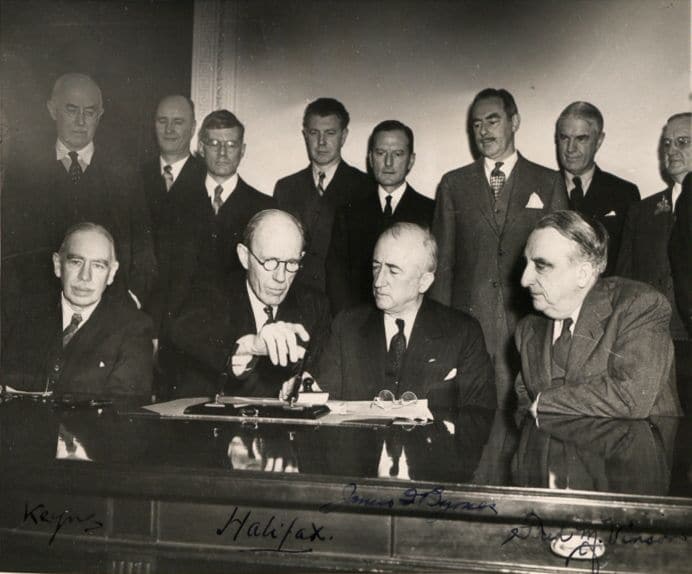
På baggrund af en debat på Modkraft.dk [2008] har diskussionen om John M. Keynes og keynesianismen fået fornyet aktualitet på venstrefløjen – til forståelse af den igangværende finanskrises karakter og venstrefløjens kriseopfattelser og krisepolitik. Vi har derfor samlet links til debatten, biografier, artikler og bøger.
Bjarne A. Frandsen, december 2008.
Rev. udgave 2018, med nyere artikler.
Se også på Socialistisk Bibliotek:
- Emneoversigten: Økonomi /Economy
- Linkboxen: Kapitalismen i krise (2) 2009-
- Linkboxen: Kapitalismen i krise (1) 2008
- Linkboxen: Marxist Books on the Global Financial Crisis and Capitalism
- Linkboxen: Karl Marx’ ‘Kapitalen’ og kriseteorier
Biografier
- Keynes, John Maynard (Leksikon.org)
- John Maynard Keynes (Wikipedia.dk). Mindre artikel på dansk.
- John Maynard Keynes. Længere artikel på engelsk med mange links og referencer.
- John Maynard Keynes (Marxists Internet Archive; Reference). Her hovedværket fra 1936 online: The general theory of employment, interest and money. Se også artiklen fra 1930: Economic possibilities for our grandchildren.
- Radical realism. By Rob Hoveman (Socialist Review, Issue 249, February 2001, online at Internet Archive). Book review of vol. 3 of Robert Skidelsky’s John Maynard Keynes biography (1992-2001). Scroll down.
Tidsskriftsartikler
På dansk (og norsk/svensk):
Keynes på egne premisser. Av Sondre Dalen (Gnist: Marxistisk Tidsskrift, nr.2, 2022)
Anmeldelse af Maria Reinertsen: John Maynard Keynes – de politiske konsekvensene (Cappelen Damm Akademisk, 2021, 159 sider). “Reinertsens bok – gitt sine rammer – en god introduksjon til Keynes’ liv og virke. Selv om den går glipp av noen interessante diskusjoner ved å legge seg litt for tett på premissene til sitt studieobjekt, makter den likevel å formidle den tematiske bredden og nåtidige relevansen til Keynes’ tekster på et forbilledlig engasjerende vis.”
Keynesianisme – en ubrugelig borgerlig teori. Af Magnus Ørberg (Revolution, 5. maj 2020) “Statens massive interventioner i økonomien har fået flere på venstrefløjen til at håbe på et comeback til efterkrigsopsvinget og keynesianisme. Men krav om »grøn keynesianisme« er – som historien også viser – ikke en vej ud af krisen for arbejderklassen.”
John Maynard Keynes: moralfilosofi og politik. Af Jesper Jespersen (Kritisk Debat, 16. februar 2019; online på Internet Archive)
“For ham kan den økonomiske politik således aldrig blive andet end et middel til at skabe rammerne om et civiliseret samfund, hvor kærlighed, skønhed, sandhed og viden sidder i førersædet, mens egoisme, grådighed og pengebegær sættes i skammekrogen – uanset hvad pengene siden hen bliver brugt til.”
Keynes, en økonom, der gjorde en forskel! Af Jesper Jespersen (Kritisk Debat, 16. december 2018). P.t. ikke online.
“Han efterlod sig ved sin død i 1946 en intellektuel og politisk arv, der muliggjorde, at lederne i den vestlige verden havde fået udviklet nogle politiske instrumenter og nogle internationale spilleregler, som sikrede en enestående økonomisk fremgang for alle samfundsgrupper i de efterfølgende 25 år.”
Keynes skal ud af skammekrogen. Af Jesper Jespersen (Magasinet Politik, 23. april 2014)
“Keynes bør huskes for hans banebrydende teorier og analyser af, hvorledes et industrisamfund opbygget som et markedsøkonomisk system med udbredt privat ejendomsret fungerer og kan bidrage til en mere menneskelig tilværelse.”
Keynesianismens muligheder og begrænsninger. Af Morten Hofmann Rytter (Kritisk Debat, 15. april 2014; online på Internet Archive)
“En revitalisering af Keynes er i min optik et vigtigt skridt på vejen mod en mere progressiv økonomisk politik.”
Keynesianisme og Enhedslisten. Af Anders Lundkvist (Modkraft.dk, 8. april 2013)
“I det følgende vil jeg argumentere for, at Keynes både kan bruges i den defensive kamp mod den herskende nyliberalisme, udbudsøkonomi og nedskæringspolitik og i den offensive kamp for at omforme kapitalismen i retning af demokratisk socialisme.”
Om keynesianismens svagheder som krisepolitik. Af Karen Helveg Petersen (Modkraft.dk, 15. juni 2012)
“Keynes, der mente, at underskudsfinansiering kunne bruges til at reducere arbejdsløsheden, analyserede ikke gældssiden af underskudsfinansieringen og dens kapitalmarkedskonsekvenser.”
Derfor er keynesianisme ikke svaret. Af Ernest Mandel (Socialistisk Information, 3. marts 2011)
“Når de katastrofale konsekvenser af frimarkeds-politikken bliver åbenlys, begynder kapitalistiske og socialdemokratiske kredse at rejse krav om, at staten kommer økonomien til undsætning, for at få den på rette kurs igen.”
Keynes går ikke igen. Af Thadeus Pato (Socialistisk Information, 18. februar 2011)
“Keynes’ kriseløsninger var radikale sammenlignet med nutidens borgerlige krisepolitik, men over for klimakrisen kommer også nykeynesianismen til kort.”
Marxisme versus keynsianisme. Af Frederik Ohsten (Revolution, 2. juli 2009)
“Sandheden er, at Keynes’ politik ikke har virket. Den blev fuldstændig miskrediteret efter krisen i 1970’erne.”
To sider af John Maynard Keynes. Af Chris Harman (Socialistisk Arbejderavis, nr.284, 5. december 2008; online på Internet Archive)
“Økonomer på både højre- og venstrefløjen fremhæver Keynes som svaret på krisen. Men når nu hans teorier kun gør meget lidt for at udfordre kapitalismens jerngreb, er det så ikke på tide, at venstrefløjen erkender hans svagheder?”.
På engelsk: Two faces of John Maynard Keynes (Socialist Review, Issue 330, November 2008)
Ham der Marx … Af Johanne Schmidt-Nielsen og Peter Nielsen (Modkraft.dk, 8. oktober 2008)
“Løsningen på krisen er den stik modsatte af liberalisternes. Markeder skal ikke dereguleres, men reguleres, begrænses og i nogle tilfælde helt afvikles.”
Kapitalismen er skyld i finanskrisen – svar til Johanne Schmidt-Nielsen. Af Adam Ring og Frederik Ohsten (Revolution, 21. oktober 2008)
“Finanskrisen har fået flere til at spørge til krisens årsager. Mange politikere mener, at kapitalismen kan reguleres så vi undgår kriser. Marx mente, at kriser er en iboende del af kapitalistisk økonomi, noget man ikke kan regulere sig ud af.”
Keynes og Marx. Af Tom Christensen (Socialistisk Revy, nr. 3, april 1998)
“Selv borgerlige økonomer erkender, at deres teorier har problemer. Nogle af dem søger nye svar hos Keynes. Tom Christiansen forklarer, hvorfor også Keynes’ teori kommer til kort.”
Derfor er keynesianisme ikke svaret (1992). Af Ernest Mandel (Socialistisk Information, 3. marts 2011)
“Når de katastrofale konsekvenser af frimarkeds-politikken bliver åbenlys, begynder kapitalistiske og socialdemokratiske kredse at rejse krav om, at staten kommer økonomien til undsætning, for at få den på rette kurs igen.”
Debatt om keynesiansk politik (pdf) (Marxistarkiv.se, 12. oktober 2016, 17 s.)
“Artikel av Guglielmo Carchedi ledde till replikväxling om keynesianismen som en användbar metod för att bekämpa kapitalistiska kriser och om krisernas beroende av den s k profitkvotens fallande tendens.”
(YouTube.com, 1:04 min.). One of the very few available video footages of Keynes as he announces with great optimism the end of “the gold cage”, 1931
In English
Keynes and the Marxists. By Nathan Tankus (Jacobin, October 11, 2023)
“Left denunciations of ‘Keynesianism’ often seem obvious and self-evident. But socialist economic analysis has had more to do with Keynes’s ideas than usually acknowledged.”
Keynes and the left (Michael Roberts Blog, February 6, 2023)
“The ideas and theories of John Maynard Keynes still dominate the economic views and policy proposals of the leaders of the labour movement in the major capitalist economies. Keynes is seen as offering a ‘third way’ between the pro-capitalist ‘free market’ economics … and the opposite of dangerously revolutionary Marxian economics.”
Keynes: capitalism’s utopian and impotent oracle of doom. By Adam Booth (In Defence of Marxism, 3 September 2021)
“The 2008 crash and coronavirus crisis have revived interest in the theories of J.M. Keynes, the liberal English economist. But a look at Keynes’ life and ideas show that he was no friend of the working class. We need socialism, not Keynesianism.”
Living for the city. By Padraic Finn (International Socialism, Issue 164, Autumn 2019). Review of Geoff Mann, In The Long Run We Are All Dead: Keynesianism, Political Economy and Revolution (Verso, 2019, 432 p.)
“Geoff Mann’s (sympathetic) critique of John Maynard Keynes … is worth reading for two main reasons: firstly, because of Keynes’s influence on economic thinking in the Labour Party and the left generally …”
Keynes: socialist, liberal or conservative? (Michael Roberts Blog, June 5, 2019). Review of James Crotty, Keynes Against Capitalism: His Economic Case for Social Liberalism (Routledge, 2019, 398 p.)
“But does this view of Keynes the ‘socialist’ really hold water?” See also review article by Gary Mongiovi: Was Keynes a Socialist? (Catalyst, Vol.3, No.4, Winter 2020). ”
The limits of Keynesianism. Part 1: John Maynard Keynes and orthodox economics. By Dominic Alexander (Counterfire, April 20, 2018) + Part 2: The assumptions Keynes makes (April 27, 2018) + Part 3: Marx, Keynes and the analysis of the trade cycle (May 4, 2018) + Part 4: The Keynesian attack on the labour theory of value (May 11, 2018) + Part 5: Can the working class make advances within capitalism? (May 18, 2018)
“This series aims to provide a detailed analysis of the kind of economics popularised by John Maynard Keynes, and used, to varying degrees of success, by governments the world over. With a Corbyn government looking a real possibility in the near future, a clear view of the opportunities and potential pitfalls that lie ahead regarding economic policy is imperative.”
Marx and Keynes in Berlin (Michael Roberts Blog, May 5, 2018)
“Keynes stood for the preservation of capitalism and its ruling class, for all its faults, over the ‘boorish proletariat’. This was my opening salvo in my presentation to the Marx 200 conference in Berlin, organised by the Rosa Luxemburg Institute.”
The Keynesian counterrevolution. By Mike Beggs (Jacobin: Reason in Revolt, 12 February 2018). Review of Geoff Mann, In the Long Run We Are All Dead: Keynesianism, Political Economy, and Revolution (Verso, 2017, 432 p.)
“What is it about capitalism that makes Keynesianism a horizon even would-be revolutionaries have trouble seeing past?” See also Geoff Mann: The Left in a foxhole? (ibid.) + except from the third chapter (Verso, Blog, 26 September 2018) + review by John Lepley: Keynes, the rabble, and revolution (New Politics, Issue 64, Winter 2018) + review by Padraic Finn: Living for the city (International Socialism, Issue 164, Autumn 2019).
Civilisation and the ‘long run’. By Michael Roberts (Weekly Worker, Issue 1149, 6 April 2017)
“Will the Keynesian radicals become mainstream conservatives when the long depression ends? … Keynes rules because he offers a third way between socialist revolution and barbarism: ie, the end of civilisation, as we (actually the bourgeois like Keynes) know it.”
Keynes 2030. By Pascal Riché (Verso, Blog, 15 February 2017)
“In 1930, the economist John Maynard Keynes published a “letter to our grandchildren”. Here Pascal Riché interviews André Orléan, who has written a preface to this astonishing text.” See Keynes’ article: Economic possibilities for our grandchildren (1930) (Marxists Internet Archive). In Danish: “Vore børnebørns økonomiske muligheder”, i:
Fra nødvendighed til frihed: om velfærdssamfund og forsørgerkultur (Klim, 1996, s.21-31)
Keynes or Marx? By Michael Roberts (The Project: A Socialist Journal, April 3, 2014; online at Internet Archive)
“The purpose of this article is to consider the contributions that John Maynard Keynes and Karl Marx can make to our understanding of the nature of the capitalist system and the causes of crises.”
Why Keynesianism is unable to solve today’s crisis. By Luca Lombardi (In Defence of Marxism, 14 January 2014)
“The world economy has been mired in a deep crisis since 2007. The bourgeois have tried everything to climb out of the crisis, from quantitative easing, to zero interest rates, to the socialization of banking losses, but all to no avail. Why is it that a modern-day version of Keynesianism cannot work?”
Marx versus Keynes in the summer (Michael Roberts Blog, August 22, 2013)
“So in my view, contrary to Keynes’ view, Marx is both right and relevant about why there was a Great Recession and why we are still in a Long Depression.”
See also: The contributions of Keynes and Marx to understanding the crisis and finding solutions (pdf) (Michael Roberts Blog). Speech at the Anti-Capitalist Initiative Summer School, Madrid, August 2013.
What’s wrong with the Keynesian answer to austerity? By Michael Roberts (Socialist Review, April 2013)
“As austerity measures bite while the economy continues to flatline, arguments for a Keynesian response to the recession are gaining traction. Marxist economist Michael Roberts casts a critical eye over the Keynesian case, arguing that it misunderstands the causes of capitalist crisis.”
Keynesianism and the crisis (pdf). By Brian O’ Boyle (Irish Marxist Review, Vol.1, No.3, 2012, p.11-26)
“The ‘Keynesian crisis’ of the 1970’s has given way to the ‘free market crisis’ of the early ‘naughties’ and unsurprisingly there are numerous Keynesians queuing up to take their revenge … [but] The logic of accumulation is pushing against the limits of the system and because of this it is highly unlikely that Keynesianism can rescue capitalism in the current conjuncture.”
Marx, Keynes, Hayek and the crisis of Capitalism. By Adam Booth (In Defence of Marxism, 29 November 2012)
“In this article, we compare and contrast their ideas in the context of the current crisis of capitalism, to see if any of these figures and their writings really do have the answers to solve the problems facing society today.”
Keynes: The great saviour and his leftwinger converts (Weekly Worker, Issue 934, October 18, 2012)
“Capitalism is in terminal decline. So why, asks Jack Conrad, do so many on the left advocate not socialism, but increased government spending, deficit financing and Keynesian solutions?”
See also letters by Arthur Bough: Keen on Keynes (Issue 938, November 15, 2012)
Could Keynes end the slump? Introducing the Marxist multiplier. By Guglielmo Carchedi (International Socialism, Issue 136, Autumn 2012, p.131-142)
“Carchedi offers a stringent critique of Keynesian policies as a way of overcoming capitalist crises.”
See also: Keynes, the profits equation and the Marxist multiplier (Michael Roberts Blog, June 13, 2012)
Neither advocate nor oppose (Weekly Worker, Issue 903, March 1, 2012)
“What should be the attitude of Marxists to Keynesianism? Arthur Bough responds to Mike Macnair.”
Promoting the national economy divides workers (Weekly Worker, Issue 900, February 9, 2012)
“Does Keynesianism represent an alternative to austerity? Mike Macnair begins by looking at John Maynard Keynes’s actual theory.”
See also Part 2: Global fight for reforms (Issue 901, February 16, 2012)
Race to the bottom: Keynesian myths and illusions. By Ismaeil Hossein-Zadeh (CounterPunch, November 4-6, 2011)
“The effectiveness of the Keynesian model is based largely on a hope, or illusion …”
På norsk: Keynesianske myter og illusjoner (Gnist/Rødt! nr.2, 2011)
The General Theory and the current crisis: A primer on Keynes’ economics. By Alejandro Reuss (Dollars & Sense, 2010)
Contents: The revolutionary who wasn’t – Fiscal policy and “crowding out” – Keynes and the limits of monetary policy – Keynes, wage and price “stickiness,” and deflation – Bubble, bubble, toil, and trouble: Keynes and financial instability.
Keynes, recovered. By Jonathan Kirshner (Boston Review, May/June 2010). Review of books by Paul Davidson, Peter Clarke and Paul Skidelsky. “In a time of economic unrest and uncertain recovery, economists are turning to Keynes – not the Keynesians.”
Keynes: A man for this season? By Walden Bello (Foreign Policy in Focus, July 8, 2009)
“Keynes’s model of managed capitalism merely postpones rather than provides a solution to one of capitalism’s central contradictions, which is the underlying cause of the current economic crisis…”
The return of Keynes? By Petrino DiLeo (International Socialist Review, Issue 63, January-February 2009)
“Is Keynesian state intervention the solution to the free-market meltdown? Petrino DiLeo looks at the real record of Keynesian policy.”
Two faces of John Maynard Keynes. By Chris Harmen (Socialist Review, Issue 330, November 2008)
“Economists, both left and right, are championing Keynes as the answer to the crisis. Since his theories do little to challenge the fundamental grip of capitalism, isn’t it time for those on the left to recognise his flaws?”
Keynes, crisis, Marx, and Keynesianism. By Martin Thomas (Workers Liberty, Issue 32, June 1996)
“John Maynard Keynes posed many sharp questions about capitalism, often further developing ideas which Marx had sketched before him. He framed the whole issue as one of ‘safeguarding capitalism’, but can ‘Keynesian’ methods really do that?”
The crisis of bourgeois economics. By Chris Harman (International Socialism, Issue 71, June 1996, p.3-56)
“The economic consensus of 30 years ago claimed it had solved the problem of crises for once and for all. The answers, it claimed, had been provided by a ‘revolution’ in economics which occurred with the publication, in January 1936, of John Maynard Keynes’ General Theory of Employment, Interest and Money.”
Why Keynes isn’t the answer: the twilight of monetarism. By Ernest Mandel (Socialist Outlook, No.29, October 10, 1992)
“Here Ernest Mandel argues that traditional Keynesian reflationary policies must be distinguished from the budget deficit policies of Thatcher and Reagan; and that capitalist reflation only brings short-term advantages for the working class, and inevitably ends up in a new recession.”
På dansk: Derfor er keynesianisme ikke svaret (Socialistisk Information, 3. marts 2011)
About Keynes and Keynesians (MR Online, June 11, 2020). Interview with Paul M. Sweezy 1987.
“The history of Keynesian theory and policy is full of paradoxes. It is important that you really understand the complexities of the history of the period.”
Marx and Keynes. By Paul Mattick (Western Socialist, November-December 1955)
“In the midst of the Great Depression, bourgeois economic theory was suddenly raised from the dead by the ‘daring’ theories of John Maynard Keynes.”
Trotsky on England (Where is Britain Going?) (Marxists Internet Archive). 1933-book review by John Maynard Keynes.
Bøger
’John Maynard Keynes: Det gode liv og den stabile markedsøkonomi’. Af Lars Andersen. -i: Socialdemokratiske tænkere. Red. Anders Dybdahl (Informations Forlag, 2014, s.170-187 + 318-19)
John Maynard Keynes. Af Jesper Jespersen (Økonomiens konger) (Jurist- og Økonomforbundet, 2002, 158 s.)
“Denne bog beskriver baggrunden for Keynes’ tænkning og hans væsentligste arbejder gennemgås. I et særskilt kapitel vurderes den efterfølgende kritik.”
Fremtidens Danmark, socialdemokraterne og keynesianismen: en doktrinhistorisk undersøgelse (pdf). Af Nils Bredsdorff. 2. udvidede udgave (Skriftserie fra Roskilde Universitetsbibliotek, nr. 35) (2000, 95 s.)
The crisis of Keynesian economics: a Marxist view. By Geoffrey Pilling (Croom Helm, 1987, 171 s.; online at Marxists Internet Archive)
“This book is a Marxist critique of certain aspects of Keynesianism. Whilst it concentrates on a review of Keynes’ writings rather than the vast literature which has grown up amongst his followers over the last 40 years and more, it does pay some attention to the work of the ‘left Keynesians’ …”
Borgerskabets reformer og marxismen: om borgerlige og socialistiske stratgier i det 20. århundrede. Af Torben Hviid Nielsen (Modtryk, 1977). Se her kap. 3: John M. Keynes (s.138-194)
Venstrekeynesianismen. Af Christoph Deutschmann (Modtryk, 1975, 215 s.). Med efterskrift: Faser i den danske reformismes udvikling (s.179-210)
Marx og Keynes. Af Paul Mattick (Røde Hane, 1973, 303 s.). Se her kap. 1: Den keynesianske ‘revolution’ (s.9-24) + kap. 2: Marx og Keynes (s.25-30). Se online-udgaver på svensk og engelsk

































